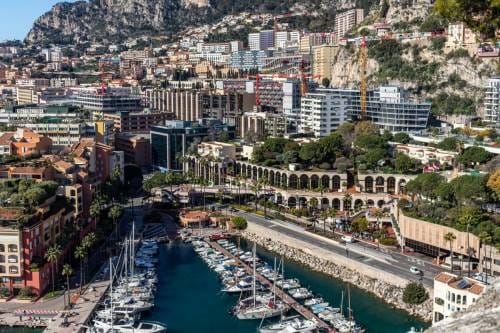“Despite tragedies that it has caused, Сovid-19 pandemic has perhaps brought some positive effects placing under the gaze of Humankind an important phenomenon that we thought very remote and which has a direct influence on our health and our life”, pointed out H.S.H. Prince Albert II of Monaco in His keynote at the 1st Monaco International Symposium on Human Health and the Ocean.
This unprecedented panel, under the high patronage of the Sovereign Prince, could finally be held at One Monte-Carlo Conference Centre on the 1st and the 2nd December 2020 both online and on site. All interventions by the most distinguished scientists, biologists and institutional representatives were particularly meaningful considering the dreadful moment we are living in.

“The Prince Albert II of Monaco Foundation (@FPA2) is pleased to support the organization of this International Summit that is a great necessity since for too long global oceans have been taken for granted and their key role was underestimated”, stated Olivier Wenden, Vice-President of FPA2 in his welcoming speech.

Oceans that are covering more than 70% of our Planet are essential drivers not only to balance Earth climate, to maintain a healthy environment, to ensure the survival of Sea biodiversity but also to cure and prevent diseases, to provide a wholesome food and to boost tourism, leisure as well as any other Blue Economy asset. Unfortunately, marine pollution has risen exponentially over the years and it currently affects all oceans. Plastic waste, oil spills, mercury, manufactured chemicals, pesticides and nutrients, just to name the main categories of pollutants.
This complex compound has largely human origins and more than 80% of it reaches the seas from the mainland, not considering atmospheric depositions and direct discharges. This is the snapshot of the current state which is evident from the Ocean Pollution and Human Health Report elaborated by the Boston College and Monaco Scientific Centre that was publicly presented on December the 3rd to give birth to the Declaration of Monaco and its Call to Action.
Professor Patrick Rampal, President of the Monaco Scientific Centre and Professor Philip J. Landrigan, Director of the Global Observatory on Pollution & Health at Boston College, chairmen of the Steering Committee, gave HelloMonaco exclusively some relevant feedbacks on the subject of the debate.

“I do believe that a direct link between marine biologists or men of science and medical scientists may cross any border through a multidisciplinary approach in order to find solutions to protect from any pollution that vast continent represented by the Oceans making them able to regenerate themselves” underlined Professor Rampal – “Covid-19 pandemic showed us that we can increase the situation by diminishing pollution as witnessed by the healthier atmospheric conditions registered during the lockdown; so, preserving good marine conditions is crucial and it concerns all”.
“All life on earth depend on the health of the ocean, and we must all work to protect the oceans so as to safeguard our lives and the lives of our children”, stressed primarily Professor Philip Landrigan (P.L.).

HelloMonaco: Professor Landrigan, what are the most urgent actions to take in order to drastically reduce the presence of toxic substances in the Oceans and prevent affecting health of living beings?
P.L.: We must consider four vital recommendations for prevention and control of ocean pollution:
1. ban production of single-use plastics, strongly identified by UN Environment and increasingly becoming the object of national legislations to cut down the use of plastic straws and single-use plastic bags;
2. ban coal combustion that would dramatically reduce the mercury pollution, a true plague for all oceans, reduce air pollution as well and slow climate change.
3. control coastal pollution from industries, agriculture, oil exploitation and sewage thus ensuring with century-lasting benefits for economies, tourism, fisheries, human health and well-being.
4. expand Marine Protected Areas that will safeguard critical ecosystems, protect vulnerable fish stocks and improve human health and well-being.
HelloMonaco: What benefits can this Symposium bring the international community?
P.L.: Human activity has taken a severe toll on our planet, and this damage to the health of the Planet is now beginning to take its toll on our health. Pollution of the oceans threatens our food, our water, and the oxygen we breathe. While the findings presented in this Symposium are alarming and urgent, ocean pollution can still be prevented and controlled. It is not too late for the international community to act. Technology, like wind and solar panels, is available to support ocean conservation through proven control strategies.
Protecting the Planet is a global concern and our collective responsibility. We need dedicated and visionary political leadership across the globe to slow and ultimately reverse this immense damage to the oceans before it becomes permanent. World leaders will be critical to preventing ocean pollution and safeguarding human health, thus recognizing the gravity of ocean pollution, acknowledging its growing dangers, engaging civil society and the global public and taking bold evidence-based actions to stop pollution at its source.

“Nowadays, thinking about human health without linking it to a wider environment is no longer possible; notably, we must consider all pathogens which surround us taking into consideration all natural species, both flora and fauna, outside Humans”, concluded Dr. Françoise Gaill, Emeritus Director of the French National Centre for Scientific Research (CNRS) and scientific adviser at the CNRS Institute of Ecology and Environment. “This Symposium is based on the assumption that we must ground the idea of ‘health’ with the entire world, with special regard to Oceans that, representing two-thirds of the earth’s surface, can give us precious information to imagine and define future strategies”.
For any further information please visit: www.oceanhealthmonaco.org










